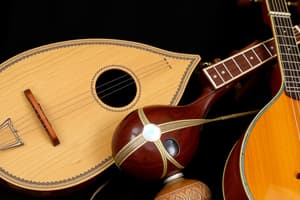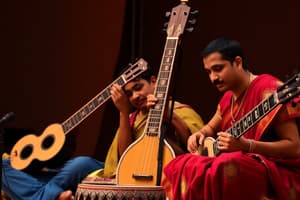Podcast
Questions and Answers
Which of the following is NOT a characteristic of the most unique and beautiful carpets produced by Turkmenistan?
Which of the following is NOT a characteristic of the most unique and beautiful carpets produced by Turkmenistan?
- Ancient art
- Distinctive patterns
- Developed by different tribes
- Produced in modern times (correct)
Which of the following is NOT an example of evidence of the early Indian civilization?
Which of the following is NOT an example of evidence of the early Indian civilization?
- Bronze statuettes
- Steatite seals
- Marble sculptures (correct)
- Copper statuettes
What is the significance of the Ajanta Caves?
What is the significance of the Ajanta Caves?
- They date back to the 2nd century BCE to the 600 CE
- They are rock cave monuments
- They contain masterpieces of Buddhist religious art
- All of the above (correct)
Which of the following is NOT a characteristic of the four-armed figure of Shiva the Cosmic Dance?
Which of the following is NOT a characteristic of the four-armed figure of Shiva the Cosmic Dance?
Which of the following is NOT a characteristic of the Transitional or Islamic Ascendancy period in Indian art?
Which of the following is NOT a characteristic of the Transitional or Islamic Ascendancy period in Indian art?
Which of the following is a unique feature of the Taj Mahal?
Which of the following is a unique feature of the Taj Mahal?
What is the traditional phrase said when playing the last tile in a game of dominoes?
What is the traditional phrase said when playing the last tile in a game of dominoes?
Which of the following is NOT a game tip mentioned in the text?
Which of the following is NOT a game tip mentioned in the text?
What does the term 'immunity' refer to in the context of health?
What does the term 'immunity' refer to in the context of health?
Which of the following is NOT part of the chain of infection mentioned in the text?
Which of the following is NOT part of the chain of infection mentioned in the text?
What is the definition of a 'communicable disease' according to the text?
What is the definition of a 'communicable disease' according to the text?
What is the definition of a 'disease' according to the text?
What is the definition of a 'disease' according to the text?
What happens when a pawn reaches the last row of the opponent's side in chess?
What happens when a pawn reaches the last row of the opponent's side in chess?
What must players say before adjusting a piece on the chessboard?
What must players say before adjusting a piece on the chessboard?
What is used in competitive games of chess to time players only when it's their turn to move?
What is used in competitive games of chess to time players only when it's their turn to move?
Why were early domino tiles called 'bones'?
Why were early domino tiles called 'bones'?
What are dominoes sometimes referred to as?
What are dominoes sometimes referred to as?
When is it believed that tile games were found in China?
When is it believed that tile games were found in China?
Which instrument is a non-membranous percussive instrument with solid resonators?
Which instrument is a non-membranous percussive instrument with solid resonators?
Which instrument is a membranous percussion instrument typically comprised of drums?
Which instrument is a membranous percussion instrument typically comprised of drums?
Which type of instrument is characterized by the use of air?
Which type of instrument is characterized by the use of air?
What plucked stringed instrument was referred to as 'vira' during the old civilization?
What plucked stringed instrument was referred to as 'vira' during the old civilization?
Which bowed stringed instrument did not occupy a place in Indian classical music?
Which bowed stringed instrument did not occupy a place in Indian classical music?
What is a regular, repeating rhythmic phrase particularly rendered on a percussive instrument called?
What is a regular, repeating rhythmic phrase particularly rendered on a percussive instrument called?
What is the primary symptom of the disease described in the text?
What is the primary symptom of the disease described in the text?
Which of the following is NOT a mode of transmission for the disease?
Which of the following is NOT a mode of transmission for the disease?
Which of the following is a recommended preventive measure for the disease?
Which of the following is a recommended preventive measure for the disease?
During which stage of the disease are non-specific symptoms like headache, runny nose, and slight fever observed?
During which stage of the disease are non-specific symptoms like headache, runny nose, and slight fever observed?
What characterizes the Illness or Clinical Stage of the disease?
What characterizes the Illness or Clinical Stage of the disease?
During which stage is the disease still communicable, although recovery seems complete?
During which stage is the disease still communicable, although recovery seems complete?
Flashcards
Ghan
Ghan
A non-membranous percussion instrument with solid resonators.
Avanaddh
Avanaddh
A membranous percussion instrument in Indian music.
Sushir
Sushir
A blown or wind instrument used in Indian music.
Tat
Tat
Signup and view all the flashcards
Vitat
Vitat
Signup and view all the flashcards
Tala
Tala
Signup and view all the flashcards
Theka
Theka
Signup and view all the flashcards
Tabla
Tabla
Signup and view all the flashcards
Mridangam
Mridangam
Signup and view all the flashcards
Banam
Banam
Signup and view all the flashcards
Esraj
Esraj
Signup and view all the flashcards
Ancient Period Art
Ancient Period Art
Signup and view all the flashcards
Ajanta Caves
Ajanta Caves
Signup and view all the flashcards
Classical Period Art
Classical Period Art
Signup and view all the flashcards
Islamic Ascendancy
Islamic Ascendancy
Signup and view all the flashcards
Mogul Period
Mogul Period
Signup and view all the flashcards
Foot and Mouth Disease
Foot and Mouth Disease
Signup and view all the flashcards
Prodromal Stage
Prodromal Stage
Signup and view all the flashcards
Transmission of FMD
Transmission of FMD
Signup and view all the flashcards
Prevention of FMD
Prevention of FMD
Signup and view all the flashcards
Dominoes
Dominoes
Signup and view all the flashcards
Traditional Domino Set
Traditional Domino Set
Signup and view all the flashcards
Pips
Pips
Signup and view all the flashcards
Origin of Dominoes
Origin of Dominoes
Signup and view all the flashcards
Pawn Promotion
Pawn Promotion
Signup and view all the flashcards
Touch and Move Law
Touch and Move Law
Signup and view all the flashcards
Chess Clocks
Chess Clocks
Signup and view all the flashcards
Infection
Infection
Signup and view all the flashcards
Communicable Diseases
Communicable Diseases
Signup and view all the flashcards
Immunity
Immunity
Signup and view all the flashcards
Chain of Infection
Chain of Infection
Signup and view all the flashcards
Study Notes
Indian Classical Music
- Ghan is a non-membranous percussive instrument with solid resonators.
- Avanaddh is a membranous percussion instrument.
- Sushir is a blown or wind instrument.
- Tat refers to plucked stringed instruments.
- Vitat refers to bowed stringed instruments.
- Tala is a regular, repeating rhythmic phrase, particularly as rendered on a percussive instrument.
- Theka is a sequence of drum syllables called 'bol'.
Indian Instruments
- Tabla is the most common instrument for keeping rhythm in Hindustani music.
- Mridangam is the most common instrument for keeping rhythms in Carnatic music.
- Banam is a single-string fiddle, without frets and with a skin-covered soundbox, played by tribal groups in central India.
- Esraj is a bowed stringed instrument found in two forms throughout the Indian subcontinent.
Indian Art
- Ancient Period (3900 BCE - 1200 CE) is characterized by bronze and copper statuettes and steatite seals.
- Ajanta Caves are 30 rock cave monuments dating back from the 2nd century BCE to the 600 CE.
- Classical Period (5th to 6th Centuries) is marked by the development of the image of Shiva, the destroyer, into Shiva the Cosmic dance.
- Islamic Ascendancy (1192-1757) or Transitional Period marked the evolution from Vedism into Hinduism or Brahmanism.
- Mogul Period (16th Century) is characterized by the enrichment of Indian culture, in painting and in architecture, with examples like the Taj Mahal.
Foot and Mouth Disease (FMD)
- FMD is characterized by the development of vesicles (blisters-like lesions) in the mouth and feet, excessive salivation, and lameness.
- Prodromal Stage is marked by non-specific signs and symptoms, such as headache, runny nose, and slight fever.
- Mode of transmission includes direct animal to animal contact, contaminated farm equipment, tools, utensils, vehicles, clothing, and shoes, and contaminated uncooked food of animal origin.
- Prevention measures include vaccination of FMD vaccine, quarantining and vaccinating new animals, prohibiting the entry of live animals, semen, embryos, and animal by-products, and washing hands, shoes, and vehicles with disinfectants.
Dominoes
- Dominoes is a game played with rectangular "domino" tiles, also called bones, tiles, stones, men, tickets, or spinners.
- A traditional Sino-European domino set consists of 28 dominoes.
- Each end of a domino is marked with a number of spots called pips or is blank.
- The game of dominoes originated in China, with evidence of tile games dating back to 1120 CE.
- Some historians credit Keung T'ai Kung in the 12th Century BCE for creating dominoes, while others attribute its invention to a statesman named Chu sz yam in 1120 CE.
Chess
- The promotion of a pawn allows it to become any other chess piece except the king.
- The Touch and Move Law states that if a player touches a piece, it must be moved if possible.
- Chess clocks are used in competitive games to time a player's moves, with a certain number of moves required in a certain total time.
Health
- Infection is an invasion of microorganisms into the body that can produce a disease.
- Diseases are any disorder where the body's normal structure or functions are disrupted or impaired.
- Communicable diseases are illnesses that spread from one person to another or from an animal to a person, or from a surface or a food.
- Immunity is the ability of an organism to resist a particular infection or toxin by the action of specific antibodies or sensitized white blood cells.
- The chain of infection includes a pathogen, reservoir, portal of exit, and promotion.
Studying That Suits You
Use AI to generate personalized quizzes and flashcards to suit your learning preferences.




